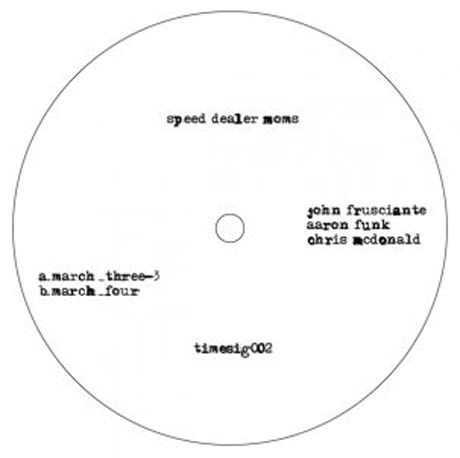Since quitting the Red Hot Chili Peppers earlier this year, modern guitar great John Frusciante has been endlessly busy with a series of projects. Aside from his solo material, Frusciante was a short-lived member of Swahili Blonde and also found time to roll out two collaborative albums with his fellow guitar freak Omar Rodríguez-López. His latest project might prove to be his least guitar-oriented yet, as he's started an improv group with Winnipeg resident Aaron Funk, better known as Venetian Snares.
Rounded out by Chris McDonald of the Alison Project, the group is called Speed Dealer Moms and actually came together approximately two years ago. In an interview with the Winnipeg Sun from January of 2009, Funk said the project had already recorded over 11 hours of material, adding, "We're just doing it for fun. I think it's cool if we never release anything. I'm totally happy with that. We're just doing it for us -- not to be a product."
He also expressed some concern for Frusciante's pseudo-celebrity status, saying, "I am kind of concerned about having to deal with people who just want to check us out because of John's brand name."
Now, the trio have changed their tune a little, announcing their debut release. The self-titled EP features two tracks, "March_Three_3" and "March_Four," denoting the days on which they were recorded earlier this year. It will be issued on Funk's Timesig imprint on vinyl on January 18, while the digital release is available now. Both tracks can be streamed here.
In a press release, Funk explains, "We noticed that we kept listening to these in the order we had recorded them as though they were already a twelve-inch. This is how our first Speed Dealer Moms release accidentally came to be."
Funk also delves deeper into the band's creative process with the following statement:
We each came in with many drum machines, synths, modulars, effect, mixers, etc. Our process is based on listening to each other's programming as we go, and reacting to that as we program our own parts, playing off each other in every stage as we write. We recorded live to stereo, and as a rule, there were no overdubs and no edits. We didn't know who would drop which of our many parts over what other parts, which made it a really exciting way to jam out a piece of music.
Rounded out by Chris McDonald of the Alison Project, the group is called Speed Dealer Moms and actually came together approximately two years ago. In an interview with the Winnipeg Sun from January of 2009, Funk said the project had already recorded over 11 hours of material, adding, "We're just doing it for fun. I think it's cool if we never release anything. I'm totally happy with that. We're just doing it for us -- not to be a product."
He also expressed some concern for Frusciante's pseudo-celebrity status, saying, "I am kind of concerned about having to deal with people who just want to check us out because of John's brand name."
Now, the trio have changed their tune a little, announcing their debut release. The self-titled EP features two tracks, "March_Three_3" and "March_Four," denoting the days on which they were recorded earlier this year. It will be issued on Funk's Timesig imprint on vinyl on January 18, while the digital release is available now. Both tracks can be streamed here.
In a press release, Funk explains, "We noticed that we kept listening to these in the order we had recorded them as though they were already a twelve-inch. This is how our first Speed Dealer Moms release accidentally came to be."
Funk also delves deeper into the band's creative process with the following statement:
We each came in with many drum machines, synths, modulars, effect, mixers, etc. Our process is based on listening to each other's programming as we go, and reacting to that as we program our own parts, playing off each other in every stage as we write. We recorded live to stereo, and as a rule, there were no overdubs and no edits. We didn't know who would drop which of our many parts over what other parts, which made it a really exciting way to jam out a piece of music.




